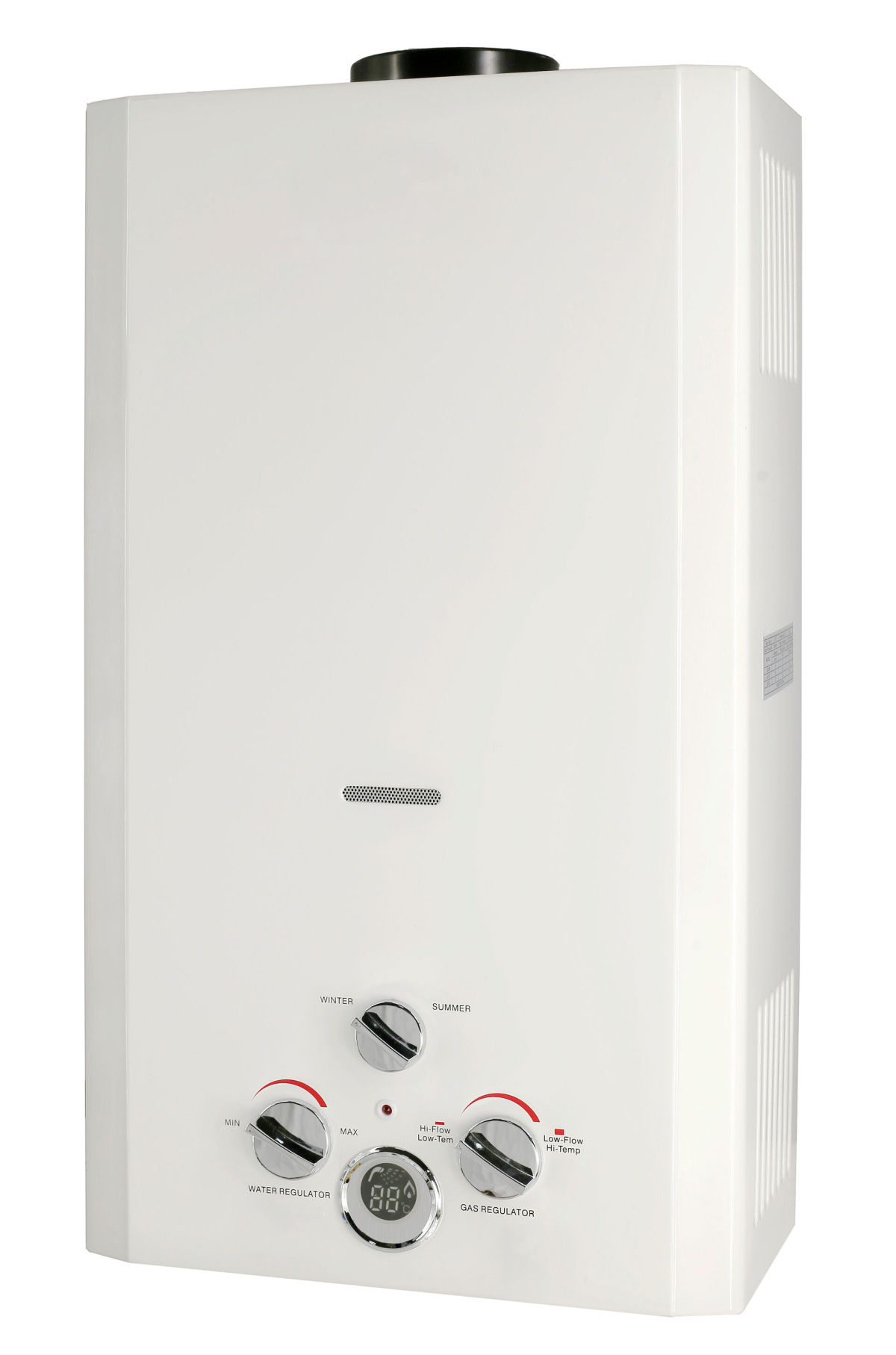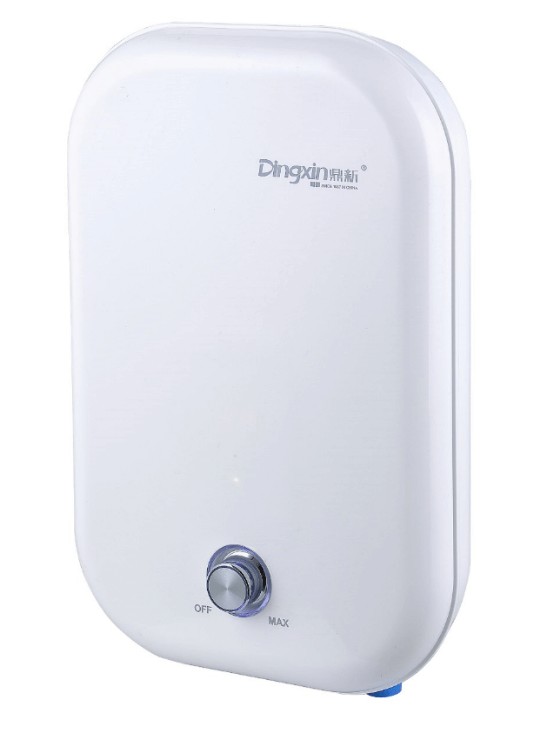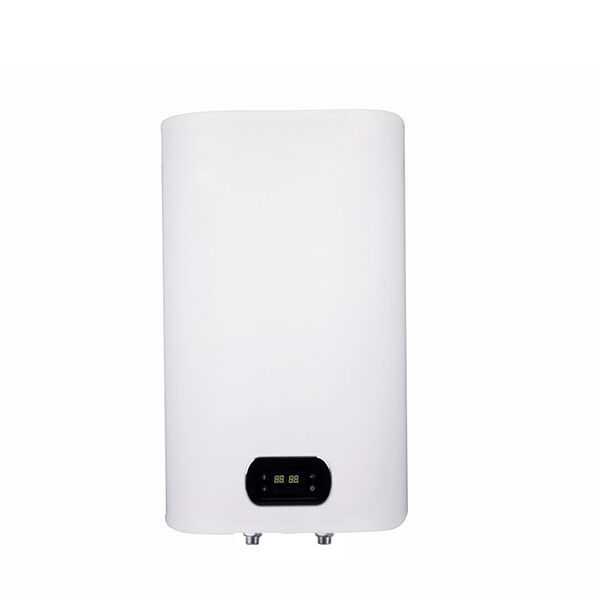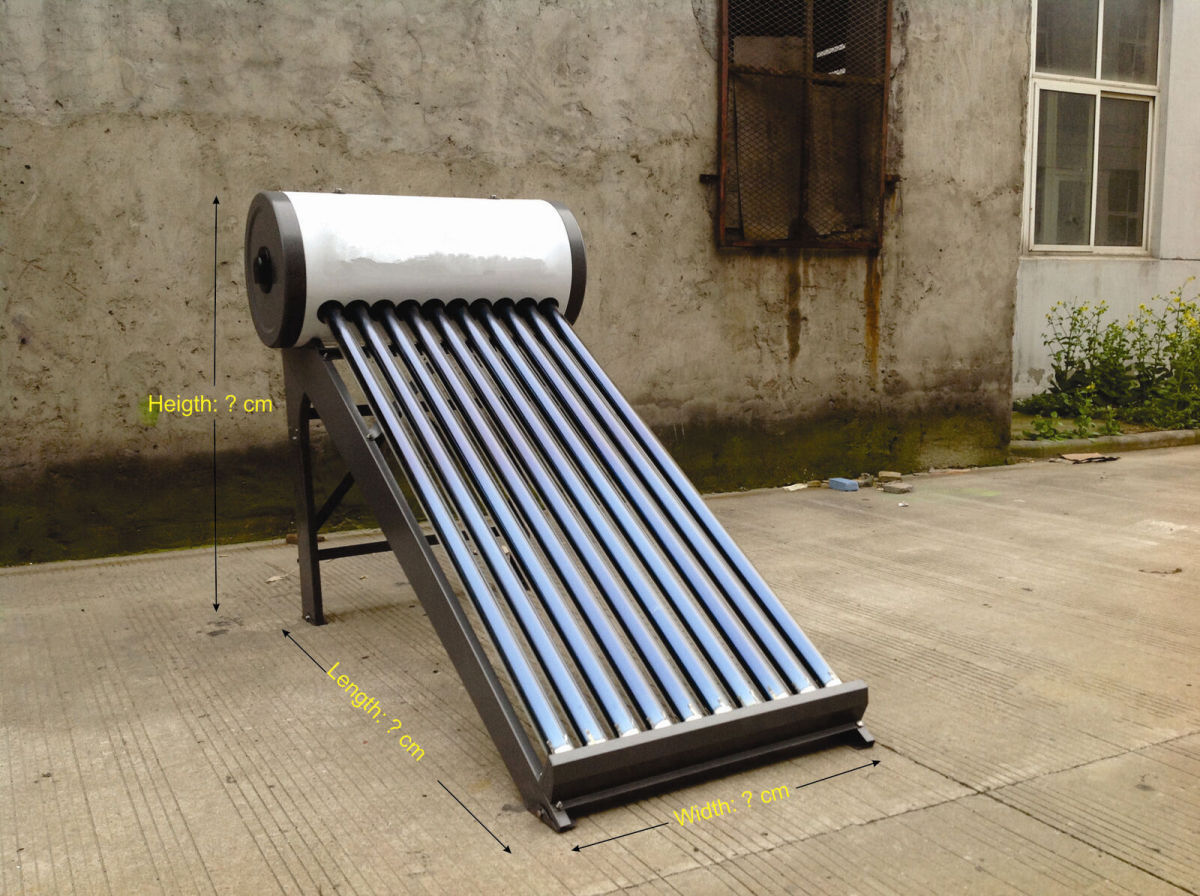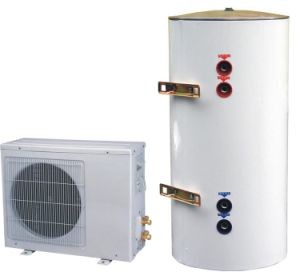Water Heaters: The Ultimate Buying Guide
Major part of your household budget is spent on water heating, particularly in winters. If you want to control your expenses, water heaters are a superb choice for everyone. All your billing frustrations will vanish away with less-energy consuming water heaters.
The technological advancements in water heaters enable them for reduction of 14-18% of utility bills. Moreover, the average household expenses on heating water for heaters are annual $400 to $600. Make your life more convenient by using energy-efficient, money-saving heaters.
Are you going to buy a new water heater? If yes, read this guide carefully to get an idea of which water heater is perfect for your needs.
Types of Water Heaters Based on Different Technology
Keeping energy efficiency in mind, there are various types of water heaters. Some of these claim to reduce fuel expenses by half to heat water. Almost every water heater type is present in the market in both forms, that is with a container and without it.
Here are some of the main types of water heaters having high popularity in the market.
1. Gas Water Heater
Gas water heaters are available in two forms:
● Tank Form
● Tankless Form
No matter whether it has a tank or not, it will work properly in both cases. The tankless gas water heater will warm water immediately as water passes through the burner. Such heaters work on the functionality of instant geysers.
However, that energy can be stored in gas water tank heaters. In such heaters, hot water is pulled down from the top to replace the cold water. But you cannot do it all the time as you need a burner as well when the temperature of the environment drops even below the thermoset point.
Above all, these energy-saving heaters maintain the preset temperature in the environment. Besides that, there is no need to worry about factors such as turning on the burner, as there is a sensor that detects and turns ON the burner automatically when required.
Pros
● Fuel efficient
● Produce instant heat
● Cost friendly
● Have long-lasting lifespan
● Can store energy in the tank
● Workable even in extremely cold weather
Cons
● Built-in sensor may fail
● Need to switch on the burner
2. Electric Water Heater
There are two types available in the electric water heater type:
● Instant Electric Water Heater
● Storage Electric Water Heater
Electric water heaters are more energy-efficient than other ordinary conventional heaters. Almost all water heaters have a 240-volt battery source. It is equipped with a 30-amp circuit breaker and sheathed cable to prevent energy losses.
On turning ON the electric water heater, the voltage flow will urge electrons to move through the coil for heating up the resistance wire. Such heated resistant wire will heat water with greater efficiency.
Moreover, electric heaters have a long warranty life in both commercial and residential areas. High-quality thermostat is built in a water heater to control voltage and other circuitry elements of the heater.
Pros
● Controlled thermostat system
● Easy to use
● Consumes less energy than conventional electric heaters
● Durable
Cons
● Failure of controlled voltage supply
● Corrosion of heating coil
3. Solar Water Heater
Solar water heaters are the most environmentally friendly source of keeping the atmosphere cozy. Such heaters absorb the heat directly from the sun and store it for water heating purposes.
All solar water heaters come with a mounted solar panel for solar energy absorption. When sun rays fall on these built-in solar panels, energy is transferred to another form. That stored energy is used to heat water in a storage tank around the circulation pipe.
Using such heaters will need some heavy investments but it will work long-lasting. By using solar water heaters, you will not only consume less energy but sustain non-renewable energy resources like coal and gas.
Pros
● Use Renewable heating energy source
● Conserve natural energy resources
● Easy to use
● Environment-friendly
Cons
● Can be failed in a severe storm in case of improper installation
● Needs heavy investment for once
4. Air Pump Water Heater
Another reliable and durable water heater is an air pump water heater. Such heaters are very efficient in capturing heat from hot air. That captured air is transferred to the water for heating. Due to its top heating pump, this heater needs a 7-feet long clearance from ceiling to floor.
In view of functionality, air pump water heaters are hybrid designed having both outdoor conditioner and indoor air handler. The former one is used to reverse the temperature of surroundings whenever needed.
No matter whether the climate is cool or hot, you can use heat energy. In the presence of hot weather, this heater works oppositely to keep the indoor environment cool by releasing heat through the outdoor conditioner. Bring this two-in-one pumping water heater to raise your living standard.
Pros
● Saves 60% energy
● Lasts for 10-15 years
● Performs dual functions
● Environment-friendly
● Cost-efficient
● Can be used as a room coolant
Cons
● Risk of high condensation
● Causes noise pollution
● Not compatible with extreme weather conditions
● Work efficiently only in the temperature of 40° F to 90° F
Features to Consider Before Buying a Water Heater
No matter which type of water heater you buy, you should never ignore its reliability and durability. Here are some factors that you might want to consider before buying a good-quality water heater.
1- Energy Efficiency
Whenever you look for a water heater, make sure that it is energy efficient. The energy-efficient water heater will not only save your cost but also save the non-renewable energy resources in the environment. The energy or fuel you use in the heater not only affects its operational cost but efficiency as well. That’s why you need to choose a water heater wisely.
2- Warranty
The usual lifespan of water heaters is from three to twelve years. As you are going to pay a little more to have a long-warranty water heater, you should be very conscious about its functionality. One of the main specs of such water heaters is larger burners along with thick insulation for speedy heating with minimum heat loss.
3- Cost
Another important factor that you can never overlook is the cost of a water heater. If you think that a water heater is costly, compare the annual operational costs of its energy-efficient models with other heaters. Prefer to have an energy-efficient heater as it will pay back immediately by saving your annual expenses.
4- Size
Water heaters are available in various sizes and efficient operating systems. No matter whether you buy a small water heater or a large one, it will work instantly. It depicts that you should use a water heater according to your heating requirement.
5- Glass-lined Tanks
If you are going to have a tank water heater, never go with unreliable ones because they will corrode immediately. Make sure to have a properly designed glass-lined tank in your heater to prevent corrosion.
6- Anti-Scale Devices
‘In some water heaters, minerals accumulate in the bottom of the tank leading to scale formation. Such scales can cause havoc in the heater operation. To keep your heater durable for a long life span, choose the one whose heating elements are made up of anti-scaling devices. Such anti-scale heaters will reduce mineral scale formation to enjoy the heater’s long-term warranty.
7- Digital Displays
Another feature that makes your water heater outstanding is a small digital display on it. Many solar water heaters are designed with digital displays to monitor temperature, pressure, and heater’s operation. Such heaters will also enable you to set a vacation mode for increasing its efficiency. Enjoy a visual display of collector temperature, pressure, and other readings on the heater.
Selection Criteria Based on Energy Consumption
After an in-depth research analysis on water heaters, we felt that energy consumption matters a lot. It’s because investing in a less expensive but high-energy-consumption heater will not pay you back in the long term. On the other hand, investing a little more for once can save you from heavy monthly, and annual expenditures.
If you are looking forward to buying a water heater, we will suggest you have an electric storage water heater.
It can cost you around $100-$200 and is much affordable for an initial purchase. Another big advantage is that it works in almost any climate condition.
Above all, tank storage water heaters are more energy-efficient, durable, and quick-responsive than tankless ones. Enjoy warm water in winters without getting worried about bills with less energy-consuming water heaters.

Please give us a message
DINGXIN story
One electric water heater branded as Dingxin, which has warmed Mr Chen for 22 years. In 1991,Mr Chen bought a new water heater and normally lived with it as long as 22 years in Wenzhou
The Family business
DINXIN ADVENTURE THROUGH 2 GENERATIONS, FROM THE START IN 1986 TO TODAY.
The family business
The founder –Dong Wanwen– started “Dingxin” (in Wenzhou in 1986, as one of the first water heater manufacture in China. With minimal resources he created the first vented water heater in Wenzhou. He has, during his 30 years in Dingxin, mixed friendly industry and home culture in a unique way and has given Dingxin the recognition as one of the earliest enterprises in china.
2rd generation –Eric Dong,is devoted to improving Dingxin’s products and processes and desires to build the company brick by brick,. The pioneering spirit lives on with product innovations featuring integrated solutions, ground-breaking material technology and added value for our customers.
Three main markets oriention of Dingxin:
• Northern China: Thanks to trust and confidence from our customers, Dingxin engages a attractive market share in North China over the last 30 years. Our products named as Dignxin delivers well-being and hotwater to two-thirds of all homes in the three north-east of provinces of china, with durable lifetime economy.
• OEM/EXPORT: We are proud to supply water heaters to various brands in the heating industry all over Europe,South America,South asia. OEM is an important part of our business because it inspires and motivates us to think innovatively, be flexible in our approach and challenge traditional mind-sets.
• Kitchen&bathroom branch: Dingxin focuses on the domestic market of kitchen&bathroom since 2016 and whose sales make up about 40% of the turnover and gives us a unique perspective and knowledge of related business lines and innovative marketing strategies which benefit all our customers.
DINGXIN story
One electric water heater branded as Dingxin, which has warmed Mr Chen for 22 years. In 1991,Mr Chen bought a new water heater and normally lived with it as long as 22 years in Wenzhou
Historic milestones
Dingxin launched a promise to replace the water heaters free of charge for those were purchased before 1995 and still normally used up to 2015. When Mr. Zhang saw this news,he immediately rushed to the Dingxin franchise shop of department store in Taiyuan city, Shanxi province. the Dingxin staff there offered Mr. Zhang for a free replacement service;
One electric water heater branded as Dingxin, which has warmed Mr Chen for 22 years. In 1991,Mr Chen bought a new water heater and normally lived with it as long as 22 years in Wenzhou .when Dingxin launched a campaign that every home could receive new water heater replacement installation service free of charge only if who purchased Dinxin water heaters before 1995 and still normally adopt it with over 22 years, Surely Mr Chen belongs to the ones who could received this fantastic service launched by Dingxin.
Mr. Zhu, in Dingxin franchise department, purchased two electric water heaters in 1988 and he spent ¥500 in all. When it comes to 2014, the two electric water heaters have been in its life time for 26 years and still have been in fantastic condition. The Dingxin promise to offer free replacement service of the two water heaters
In 1993, Mr. Wang purchased this water heater in franchise department of Tangshan city, Hebei province.and it is well in circulation for over 23 years, Dingxin offer free replacement service out of security considerations in 2015
Warranty Information
Dingxin warrants for 2 years from the date of purchase, that the Product will: i) conform to Dingxin approval specification, ii) be free from defects in materials and workmanship, subject to conditions below. All electric components carry a 2-year warranty
Scope
Dingxin warrants for 2 years from the date of purchase, that the Product will: i) conform to Dingxin approval specification, ii) be free from defects in materials and workmanship, subject to conditions below. All electric components carry a 2-year warranty.
The warranty is voluntarily extended by Dingxin to 5 years for the premium models. This extended warranty only applies to Products purchased by a consumer, that has been installed for private use and that has been distributed by Dingxin or by a distributor where the Products have been originally sold by Dingxin.
The extended warranty does not apply to Products purchased by commercial entities or for Products that have been installed for commercial use. These shall be subject only to the mandatory provisions of the law. The conditions and limitations set out below shall apply.
Warranty Information
Dingxin warrants for 2 years from the date of purchase, that the Product will: i) conform to Dingxin approval specification, ii) be free from defects in materials and workmanship, subject to conditions below. All electric components carry a 2-year warranty
Coverage
If a defect arises and a valid claim is received within the statutory warranty period, at its option and to the extent permitted by law, Dingxin shall either; i) repair the defect, or; ii) replace the product with a product that is identical or similar in function, or; iii) refund the purchase price.
Dingxin possess all property of any exchanged Product or component. Any valid claim or service does not extend the original warranty. The replacement received Product or part does not carry a new warranty.
Manufacturing
Excellent working condition & longer service life: no leakage, rust-free, high strength and strong resistance to corrosion
Tank comparison
COMPARISION BETWEEN SS TANK AND ENAMEL TANK
ENAMEL TANK
Porcelain Enamel Tank - is a trusted & proven technology for inner tank of water heaters. Used widely across the world, it is ideal for long life & trouble free performance in all kinds of water. More than 95% of water heaters produced worldwide are with enamel tanks. Corrosion protection is very good due to fusion of glass layer to metal.
SS TANK
Stainless Steel Tank - this is an outdated technology that manufacturers are moving out of now. Corrosion protection is very poor, particularly in hard water and due to poor welding quality.
SL Description Enamel Tank SS Tank
1 Protection Coating Porcelain Enamel -
2 Coating Type Inorganic None
3 Coating Thickness 250 - 400 microns None
4 Coating Adhesion Fused with metal None
5 Baking Temperature 850 deg C -
6 Life of the Coating Long life -
7 Usage Widely used Internationally Limited. In very few countries
8 Material Mild Steel Stainless Steel
9 Thickness 2.0mm 0.63
10 Rated Pressure 8kg/cm2 3kg/cm2 & 6kg/cm2
11 cathodic protection Magnesium Anode -
12 Hard water Suitability Good Poor
13 Corrosion Protection V.Good Poor-Average
14 Hot Water resistant V.Good V.Good
15 Approved Quality Standards BIS, IEC, DIN & UL BIS
HARD WATRT
As so common problem for millions of households across the country.Hard water means excessive dissolved minerals, specifically calcium and magnesium in tap water various in different countries.
Hard water is a negative impact because of much limescale it brings, Thus, in water heaters the heated hard water forms a scale of limescale deposits on the tank surface and reduces the heat conductivity of heaters sometimes even leading to its breakdown. and this contributes to inefficiency and costly electricity bill . Limescale has been known to increase energy bills by up to 25%.
Efficiency loss chart(limes scale thickness as variable)
Manufacturing
Excellent working condition & longer service life: no leakage, rust-free, high strength and strong resistance to corrosion
Water heater tank
Advantage of Enamel coating water tank:
1. Excellent working condition & longer service life: no leakage, rust-free, high strength and strong resistance to corrosion。
2. Clean energy and green product: no poisonous metal such as plumbum, hydrargyrum and chromium, bring health to your life。
3. Do good to heat preservation
1. Excellent working condition & longer service life
2. Clean energy and green product
3. Do good to heat preservation
Workmanship of enamel water tank:
1. High-strength low-carbon steel plate
2. Ultra-fine powder enamel layer
3. Blue high-temperature calcination coating
4. Three-layer strengthened protection
5. No deformation under 100,000 times impulse test
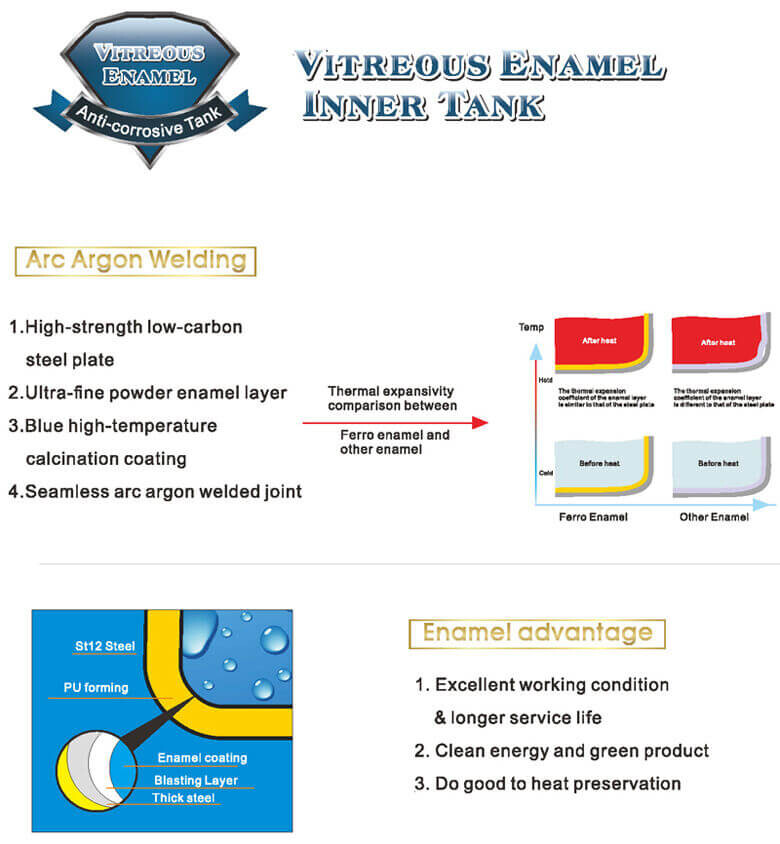
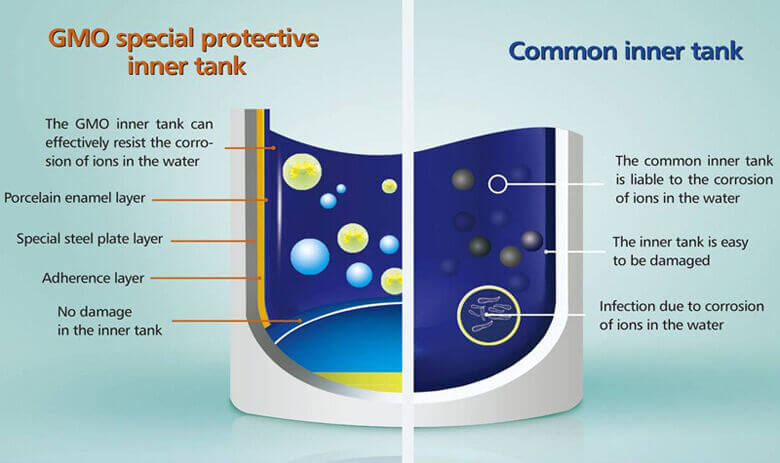
Downloads
Excellent working condition & longer service life: no leakage, rust-free, high strength and strong resistance to corrosion
Installation and manuals
Downloads
Excellent working condition & longer service life: no leakage, rust-free, high strength and strong resistance to corrosion
Product Catalogue
- Exporting Electric Water Heaters to Africa: Market Insights and Strategies
- Small-Capacity Electric Water Heaters in Africa: Market Preferences Across Key Countries
- How to know the quality of stainless steel electric heating element?
- What are the basic structures of stainless steel electric heating element?
- Let's Take A Look At The Inner Tank Material!
Warranty Information
Dingxin warrants for 2 years from the date of purchase, that the Product will: i) conform to Dingxin approval specification, ii) be free from defects in materials and workmanship, subject to conditions below. All electric components carry a 2-year warranty
Conditions
The Product is manufactured to suit most household water supplies. However, there are certain water chemistries (outlined below) that can have a detrimental effect on the Product and its life expectancy. If there are uncertainties regarding water quality, the local water supply authority can supply the necessary data. The warranty applies only if the conditions set out below are met in full:
• The Product has been installed by a professional installer, in accordance with the instructions in the installation manual and all relevant Codes of Practice and Regulations in force at the time of installation.
• The Product has not been modified in any way, tampered with or subjected to misuse and no factory fitted parts have been removed for unauthorized.
• Any disinfection has been carried out without affecting the Product in any way whatsoever. The Product shall be isolated from any system chlorination.
• The Product has been in regular use from the date of installation. If the Product is not intended to be used for 60 days or more, it must be drained.
• Service and/or repair shall be done according to the installation manual and all relevant codes of practice. Any replacement parts used shall be original DINGXIN i spare parts.
• Any third-party costs associated with any claim has been authorized in advance by DINGXIN in writing.
• The purchase invoice and/or installation invoice, a water sample as well as the defective product is made available to DINGXIN i upon request.
• Failure to follow these instructions and conditions may result in product failure, and water escaping from the Product.
Warranty Information
Dingxin warrants for 2 years from the date of purchase, that the Product will: i) conform to Dingxin approval specification, ii) be free from defects in materials and workmanship, subject to conditions below. All electric components carry a 2-year warranty
Limitations
The warranty does not cover:
• Any fault or costs arising from incorrect installation, incorrect application, lack of regular maintenance in accordance with the installation manual, neglect, accidental or malicious damage, misuse, any alteration, tampering or repair carried out by a non-professional, any fault arising from the tampering with or removal of any factory fitted safety components or measures.
• Any consequential damage or any indirect loss caused by any failure or malfunction of the Product whatsoever.
• Any pipework or any equipment connected to the Product.
• The effects of frost, lightning, voltage variation, lack of water, dry boiling, excess pressure or chlorination procedures.
• The effects of stagnant (de-aerated) water if the Product has been left unused for more than 60 days consecutively.
• Damage caused during transportation. Buyer shall give the carrier notice of such damage.
• Costs arising if the Product is not immediately accessible for servicing.
These warranties do not affect the Buyer’s statutory rights.
FAQ
Q1:How long does the order take?
A:Sample order will be finished within 15 days while normal order will be finished within 25-30 days after receiving deposit,
Q2:What are my WARRANTY OPTIONS on the water heaters you sell?
Dingxin Water Heater Company provides a basic, standard warranty. Our basic warranty is one year for full units or 1% spare parts service.
Q3:Do you accept OEM or ODM orders?
A:Yes, Our R&D team will offer one stop service for you from original idea to finished product.
Q4:What’s the MOQ?
A: Normally MOQ is 1*20 ft container(trial order's quantity is negotiable)
Q5:How can I visit your factory?
A: Sure,Our factory is located in Shaoxing Shengzhou, China, near to Hangzhou Airport and Ningbo Airport .You are always welcome to visit us! We will offer pick up service and free accomodation.
Q6:When can I get the price?
A:Within 24 hours after we get your inquiry.
Q7:Can you offer sample for quality check before order ?
A:Yes , we provide sample service before mass order.
Q8: what other size water heater you have ?
A: We have storage models of 8L\10L\15L\30L\50L\60L\80L\100L\120L\150L,and besides storage model,we also work on instant models,and gas models.
Q9: Can the price be cheaper?
A: Price always follows its quality and we will offer truthful opinion on the marketing strategy on pricing and quality orientation.
Q10: What payment terms?
A: T/T; L/C,West Union or other payment term negotiable
Please give us a message

